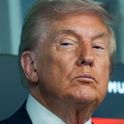Read more: What would Trump do?
There will be fewer delegates up for grabs in today’s New York presidential primary than there have been in some previous primaries, but it is important. The way in which the 95 Republican and 291 Democratic delegates that are there for the taking will be distributed will have a significant bearing on the candidates' cumulative delegate counts. These will determine the choice of presidential nominees at the party conventions this summer, ahead of the election in November. Away from the politics of the primary itself, this presidential contest is already shaping up to be significant, and not just for the US.
As the economist Patrick Chovanec has noted, President Harry S Truman once said that the occupant of the Oval Office is a glorified PR man who spends his time flattering, kissing and kicking people to get them to do what they’re supposed to do anyway. That may have been suitably self-deprecating, and it is fair to say that some presidents have accomplished much more, and much less than this. Yet, this time, Donald Trump, his Republican rival Ted Cruz and Bernie Sanders—Senator from Vermont, a self-proclaimed socialist, and Democratic presidential nominee—are exploiting a widespread sense of insecurity in response to globalisation and new technologies, perhaps also anger in the wake of the enduring legacy of the financial crisis. At the very least, they are changing the election platform for everyone, including Hilary Clinton. No candidate can now be seen to support the status quo of globalisation, or afford not to be critical of free trade in sectors such as aerospace, capital goods, software, technology and pharmaceuticals—despite the fact that America is one of its biggest beneficiaries.
On the Democratic side, Bernie Sanders is campaigning for a more NHS-style healthcare system, free college tuition funded by a financial transactions tax, higher marginal tax rates, the break-up of banks, and "fairer" trade for American workers (this is code for some protectionism). Though his campaign has been chaotic and his policies lack sufficient detail, he has clearly "themed" his political position in a recognisable way. This has made Hilary Clinton compete in the same rhetorical space—for example, she has been critical of the Trans Pacific Partnership trade deal. It has also cast her as representing "more of the same."
On the Republican side, Trump has carved out a strong populist position also premised on "making America great again." This involves large tax cuts, the protection of American workers, the deportation of illegal immigrants, the "wall" along the Mexican border, huge tariffs on Chinese imports and withdrawal from the defence agreements with Europe, Japan and South Korea. He thinks NATO is obsolete and he would happily see America retreat into its own shell. His principal opponent now, Ted Cruz, though less extreme, is not so different in political outlook. However, he has his own specific views that include shrinking the US government and abolishing the Internal Revenue Service.
In this presidential election campaign, then, potentially major changes in the US are being touted, but for the rest of us, the spectre of US isolationism and protectionism looms large. It may be paler under a Clinton presidency, but no one can know for sure how things will pan out in November, let alone thereafter. This has significant implications, not least for UK citizens now contemplating the EU referendum. The US accounts for a quarter of the stock of our foreign direct investment and 17 per cent of our exports. It is second in importance after the EU. The US is not a benign global hegemon and champion of free trade. If it becomes even less like one, British interests would be surely be compromised outside the EU. We would all lose out in such circumstances: the implication would be that US relations with China and other economically important countries would deteriorate at a time when they themselves are enduring rising economic stress.
Prediction markets—which it should be noted are not always right, and were very wrong about Trump's chances of success in the Republican race—suggest that this sort of dystopia is unlikely to materialise. They say that Hilary Clinton has a 91 per cent chance of being the Democratic nominee, and will go on to become President, while Donald Trump has a 56 per cent chance of being the Republican nominee, and a mere 15 per cent chance of making it to the Oval Office. Moreover, according to a recent Pew survey, over three-fifths of Democratic voters expect the party to unite behind Clinton, while only a third of Republican voters expect their party to unite behind Trump.
For now, we can only watch the New York primary delegate count, and then on the 26th the next contests in Connecticut, Delaware, Pennsylvania, Maryland, and Rhode Island. These will allocate up to 172 Republican and 753 Democratic delegates. Then on to Indiana on 3rd May (57 and 92, respectively), and other states before the big finale on 7th June of California (172 and 546), and New Jersey (51, and 142).
Currently, Trump has 744 delegates while Cruz has 559. At least 1237 are needed to win. Cruz had a great weekend last week, winning in Georgia, Wyoming, South Carolina, Kansas and Florida, and winning delegates in a ratio of 4:1 against Trump. Even though the latter is a strong favourite to win in New York, he can’t be certain all his delegates will actually vote for him at Republican convention. If the convention is deadlocked, they could switch to Cruz at the drop of a hat. Cruz has done well in these elections in some states that Trump actually won. If Trump can’t get close to the 1237 benchmark on the first ballot, the Republican party would be in serious trouble and may rift further—or even worse.
Hilary Clinton is also favoured to win New York, adding to her pledged delegate count of 1307, against Sanders’s 1094. (With pledged delegates, the understanding is that they will vote to support a certain candidate at a party's convention). The nominee needs 2383 delegates to win at the Democratic convention, and Clinton has an additional advantage in so-called superdelegates (that is, unpledged party leaders who are free to support any candidate. She will get the vast majority of the 712 of these available at the convention—she already has 469 against 31 for Sanders—so the potential delegate count at the moment is 1776 against 1125. Clinton would only risk losing these some of these superdelegates in the event she lost her lead in the pledged count.
Will the economy make a difference to the race? As Bill Clinton’s onetime political strategist James Carville famously said on the matter of which issues are key, "it’s the economy, stupid." US job creation is doing just fine, and for the last six months, the labour force participation rate has finally been picking up after years of decline. This means more Americans are making themselves available for work and re-entering the labour force. But demand in the US is soft. The economy grew at just 1.4 per cent per annum at the end of 2015, and the current projection for the first quarter is appreciably below 1 per cent. And the more people come back to work, the longer it will take for wages and salaries to pick up from a steady but sluggish rate of 2-2.25 per cent. This at a time when inflation is running close to that level and rising slowly.
Wage increases are closely correlated with a rising participation rate for prime age workers aged 25-54. This rate has been on a tear in the last several months, and so there’s a chance that after a weak start, the economy will look a bit feistier as the conventions and the November election come along. Strictly speaking that should favour Hilary, but for now, the words "count," "chicken" and "hatch" still figure prominently.
Now read: Ted Cruz: a man as talented as he is despised
There will be fewer delegates up for grabs in today’s New York presidential primary than there have been in some previous primaries, but it is important. The way in which the 95 Republican and 291 Democratic delegates that are there for the taking will be distributed will have a significant bearing on the candidates' cumulative delegate counts. These will determine the choice of presidential nominees at the party conventions this summer, ahead of the election in November. Away from the politics of the primary itself, this presidential contest is already shaping up to be significant, and not just for the US.
As the economist Patrick Chovanec has noted, President Harry S Truman once said that the occupant of the Oval Office is a glorified PR man who spends his time flattering, kissing and kicking people to get them to do what they’re supposed to do anyway. That may have been suitably self-deprecating, and it is fair to say that some presidents have accomplished much more, and much less than this. Yet, this time, Donald Trump, his Republican rival Ted Cruz and Bernie Sanders—Senator from Vermont, a self-proclaimed socialist, and Democratic presidential nominee—are exploiting a widespread sense of insecurity in response to globalisation and new technologies, perhaps also anger in the wake of the enduring legacy of the financial crisis. At the very least, they are changing the election platform for everyone, including Hilary Clinton. No candidate can now be seen to support the status quo of globalisation, or afford not to be critical of free trade in sectors such as aerospace, capital goods, software, technology and pharmaceuticals—despite the fact that America is one of its biggest beneficiaries.
On the Democratic side, Bernie Sanders is campaigning for a more NHS-style healthcare system, free college tuition funded by a financial transactions tax, higher marginal tax rates, the break-up of banks, and "fairer" trade for American workers (this is code for some protectionism). Though his campaign has been chaotic and his policies lack sufficient detail, he has clearly "themed" his political position in a recognisable way. This has made Hilary Clinton compete in the same rhetorical space—for example, she has been critical of the Trans Pacific Partnership trade deal. It has also cast her as representing "more of the same."
On the Republican side, Trump has carved out a strong populist position also premised on "making America great again." This involves large tax cuts, the protection of American workers, the deportation of illegal immigrants, the "wall" along the Mexican border, huge tariffs on Chinese imports and withdrawal from the defence agreements with Europe, Japan and South Korea. He thinks NATO is obsolete and he would happily see America retreat into its own shell. His principal opponent now, Ted Cruz, though less extreme, is not so different in political outlook. However, he has his own specific views that include shrinking the US government and abolishing the Internal Revenue Service.
In this presidential election campaign, then, potentially major changes in the US are being touted, but for the rest of us, the spectre of US isolationism and protectionism looms large. It may be paler under a Clinton presidency, but no one can know for sure how things will pan out in November, let alone thereafter. This has significant implications, not least for UK citizens now contemplating the EU referendum. The US accounts for a quarter of the stock of our foreign direct investment and 17 per cent of our exports. It is second in importance after the EU. The US is not a benign global hegemon and champion of free trade. If it becomes even less like one, British interests would be surely be compromised outside the EU. We would all lose out in such circumstances: the implication would be that US relations with China and other economically important countries would deteriorate at a time when they themselves are enduring rising economic stress.
Prediction markets—which it should be noted are not always right, and were very wrong about Trump's chances of success in the Republican race—suggest that this sort of dystopia is unlikely to materialise. They say that Hilary Clinton has a 91 per cent chance of being the Democratic nominee, and will go on to become President, while Donald Trump has a 56 per cent chance of being the Republican nominee, and a mere 15 per cent chance of making it to the Oval Office. Moreover, according to a recent Pew survey, over three-fifths of Democratic voters expect the party to unite behind Clinton, while only a third of Republican voters expect their party to unite behind Trump.
For now, we can only watch the New York primary delegate count, and then on the 26th the next contests in Connecticut, Delaware, Pennsylvania, Maryland, and Rhode Island. These will allocate up to 172 Republican and 753 Democratic delegates. Then on to Indiana on 3rd May (57 and 92, respectively), and other states before the big finale on 7th June of California (172 and 546), and New Jersey (51, and 142).
Currently, Trump has 744 delegates while Cruz has 559. At least 1237 are needed to win. Cruz had a great weekend last week, winning in Georgia, Wyoming, South Carolina, Kansas and Florida, and winning delegates in a ratio of 4:1 against Trump. Even though the latter is a strong favourite to win in New York, he can’t be certain all his delegates will actually vote for him at Republican convention. If the convention is deadlocked, they could switch to Cruz at the drop of a hat. Cruz has done well in these elections in some states that Trump actually won. If Trump can’t get close to the 1237 benchmark on the first ballot, the Republican party would be in serious trouble and may rift further—or even worse.
Hilary Clinton is also favoured to win New York, adding to her pledged delegate count of 1307, against Sanders’s 1094. (With pledged delegates, the understanding is that they will vote to support a certain candidate at a party's convention). The nominee needs 2383 delegates to win at the Democratic convention, and Clinton has an additional advantage in so-called superdelegates (that is, unpledged party leaders who are free to support any candidate. She will get the vast majority of the 712 of these available at the convention—she already has 469 against 31 for Sanders—so the potential delegate count at the moment is 1776 against 1125. Clinton would only risk losing these some of these superdelegates in the event she lost her lead in the pledged count.
Will the economy make a difference to the race? As Bill Clinton’s onetime political strategist James Carville famously said on the matter of which issues are key, "it’s the economy, stupid." US job creation is doing just fine, and for the last six months, the labour force participation rate has finally been picking up after years of decline. This means more Americans are making themselves available for work and re-entering the labour force. But demand in the US is soft. The economy grew at just 1.4 per cent per annum at the end of 2015, and the current projection for the first quarter is appreciably below 1 per cent. And the more people come back to work, the longer it will take for wages and salaries to pick up from a steady but sluggish rate of 2-2.25 per cent. This at a time when inflation is running close to that level and rising slowly.
Wage increases are closely correlated with a rising participation rate for prime age workers aged 25-54. This rate has been on a tear in the last several months, and so there’s a chance that after a weak start, the economy will look a bit feistier as the conventions and the November election come along. Strictly speaking that should favour Hilary, but for now, the words "count," "chicken" and "hatch" still figure prominently.
Now read: Ted Cruz: a man as talented as he is despised












